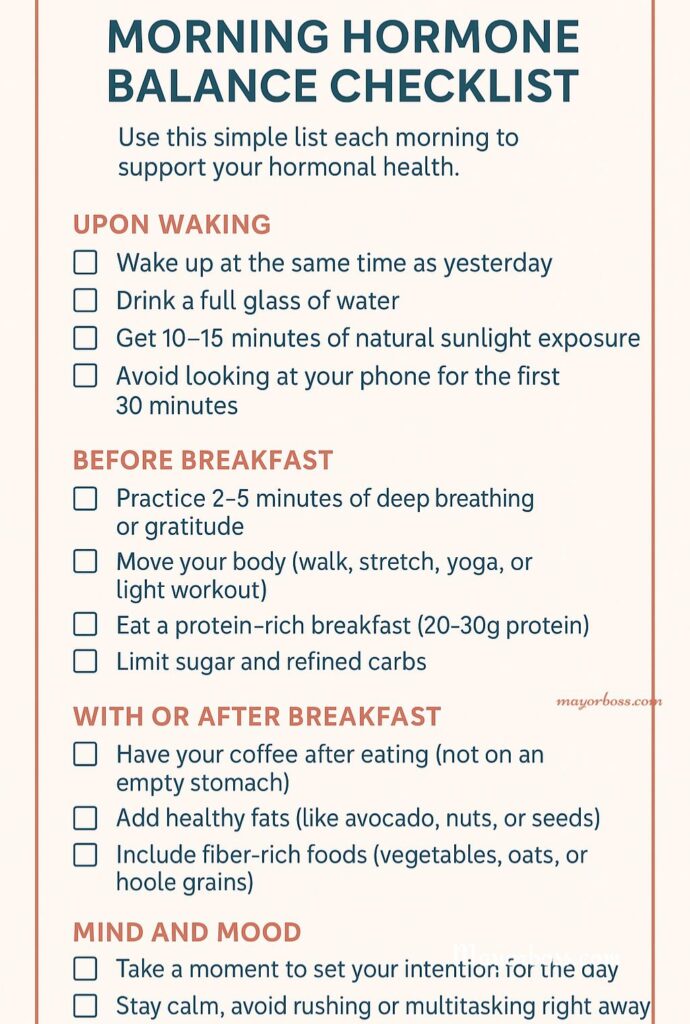Morning Habits That Support Hormonal Balance in Women
Hormones control nearly every function in a woman’s body. From mood and metabolism to sleep and reproductive health, hormones work around the clock to keep things in order. But when they become imbalanced—due to stress, poor sleep, diet, or age—everything can feel off. The good news? A few intentional morning habits can help bring your hormones back into balance.
Your mornings set the tone for the rest of the day. What you do in those first few hours can either support or disrupt your hormonal health. Keep reading to learn some simple, science-backed habits that can help.

Wake Up at the Same Time Every Day
Your body runs on a 24-hour internal clock called the circadian rhythm. It tells your hormones when to rise and fall. Irregular sleep and wake times can throw this rhythm off and affect hormone production—especially cortisol, melatonin, and insulin.
Try to wake up around the same time every morning, even on weekends. This consistency helps regulate your sleep-wake cycle, balances cortisol levels, and improves energy and mood throughout the day.
Let Natural Light Hit Your Eyes Early
As soon as you wake up, aim to get some natural sunlight within the first 30 to 60 minutes. Light signals your brain to lower melatonin and raise cortisol in a healthy pattern. This helps you feel more alert in the morning and supports better sleep at night.
Stand by a window, take a short walk outside, or simply sit on your porch. Even 10 to 15 minutes of natural light can help align your circadian rhythm and improve hormone function.
Eat a Protein-Rich Breakfast
Skipping breakfast or eating a sugary meal can spike your blood sugar, thereby leading to a crash later in the day. That crash can disrupt insulin levels and increase cravings, mood swings, and fatigue.
Instead, focus on a balanced breakfast that includes:
- High-quality protein (eggs, Greek yogurt, cottage cheese, or plant-based options)
- Healthy fats (avocado, nuts, seeds)
- Fiber-rich carbs (vegetables, oats, whole grains)
This combination helps keep blood sugar steady, which reduces stress on your adrenal glands and supports hormonal balance.
Avoid Coffee on an Empty Stomach
Many women start their day with coffee. But drinking caffeine before eating can raise cortisol too quickly, which may affect your energy, digestion, and hormone levels over time.
Try this instead:
- Drink a glass of water first thing in the morning to rehydrate.
- Eat a small breakfast or snack before your coffee.
- Choose gentler options like matcha or herbal tea if you’re sensitive to caffeine.
This simple shift can reduce the stress response and protect your adrenal health.
Move Your Body—Even a Little
You don’t need an intense workout to benefit your hormones. Gentle morning movement helps regulate cortisol, boost endorphins, and support insulin sensitivity.
Try one of these low-impact options:
- A 20-minute walk
- Light yoga or stretching
- A short resistance workout
Consistency matters more than intensity. The goal is to get your blood flowing and support hormone function without stressing your system.
Take Time to Breathe and Center Yourself
Stress is one of the top disruptors of hormone balance. When stress is chronic, your body produces too much cortisol, which can interfere with estrogen, progesterone, and thyroid hormones.
Take just 5 minutes each morning to slow down:
- Practice deep breathing
- Meditate
- Write in a journal
- Practice gratitude
These simple practices calm your nervous system and help set a peaceful tone for the rest of your day.
Prioritize Protein and Hydration in the First Hour
Your body has been fasting overnight. Replenishing it with water and nutrients right after waking helps regulate your metabolism and hormones.
Aim to:
- Drink a full glass of water shortly after waking
- Eat 20–30 grams of protein within the first hour
- Avoid heavy sugar or refined carbs first thing
These steps support steady blood sugar, reduce cravings, and give your body what it needs to function properly.
Be Gentle with Your Mornings
Lastly, avoid starting your day in a rush or chaos. Loud alarms, scrolling your phone in bed, or jumping right into stress can affect your nervous system and cortisol levels.
Instead:
- Use a calming alarm sound
- Avoid screens for the first 30 minutes
- Start your day with intention—not stress
Your hormones respond to your environment. Creating a calm, nourishing morning routine can improve your entire day—and your long-term health.
Morning Hormone Balance Checklist
Use this simple list each morning to support your hormonal health.

Final Thoughts
Hormonal balance isn’t just about supplements or medical treatments. It starts with the little things you do every day—especially in the morning. As mentioned above, waking at the same time, getting natural light, eating well, moving gently, and managing stress may support your body’s natural rhythm.
These habits don’t need to be perfect. Start small. Choose one or two, and build from there. Your body will notice. So will your energy, mood, and overall health.
